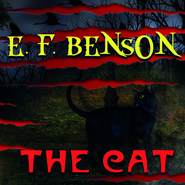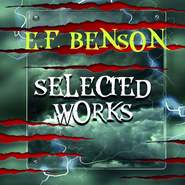По всем вопросам обращайтесь на: info@litportal.ru
(©) 2003-2025.
✖
Mammon and Co.
Настройки чтения
Размер шрифта
Высота строк
Поля
Mammon and Co.
Edward Benson
Benson E. F. Edward Frederic
Mammon and Co
BOOK I
CHAPTER I
THE CITY DINNER
"Egotism is certainly the first," said Lady Conybeare with admirable firmness; "and your inclination towards your neighbour is the second."
Now, this was the sort of thing which Alice Haslemere liked; and she stopped abruptly in the middle of her rather languishing conversation with nobody in particular to ask for explanations. It sounded promising.
"The first what, and the second what, Kit?" she inquired.
"The first and the second lessons," said Lady Conybeare promptly. "The first and the second social virtues, if you are particular. I am going to set up a school for the propagation of social virtues, where I shall teach the upper classes to be charming. There shall be a special class for royalty."
Lady Haslemere was not generally known as being particularly particular, but she took her stand on Kit's conditional, and defended it.
"There is nothing like particularity – nothing," she said earnestly, with a sort of missionary zeal to disagree with somebody; "though some people try to get on without it."
Being a great friend of Kit's, she knew that it was sufficient for her to state a generality of any kind to get it contradicted. She was not wrong in this instance. Kit sighed with the air of a woman who meant to do her unpleasant duty like a sister and a Christian.
"Dear Alice," she said, "there is nothing so thoroughly irritating as particularity. I am not sure what you mean by it, but I suppose you allude either to people who are prudes or to people who are always letting fly precise information at one. They always want it back too. Don't you know how the people who insist on telling one the exact time are just those who ask one for the exact time. I never know the exact time, and I never want to be told it. And I hate a prudish woman," she concluded with emphasis, "as much as I abhor a well-informed man."
"Put it the other way round," said Lady Haslemere, "and I agree with you. I loathe a prudish man, and I detest a well-informed woman."
"There aren't any of either," said Lady Conybeare.
She sat up very straight in her chair as she made this surprising assertion, and arranged the lace round her throat. Her attitude gave one the impression somehow of a rakish frigate clearing for action, and on the moment came the first shot.
"I am a prude," said a low, bass voice at her elbow.
Kit scarcely glanced round.
"I know you are," she said, replying with a heavy broadside; "but then you are not a man."
"That depends on what you mean by a man," said the voice again.
The speaker was so hidden by the arms of the low chair in which he sat, that a knee, shin and foot, in a horizontal line on the invisible support of another knee, was all that could be seen of him.
"I mean a human being who likes killing things," said Kit without hesitation.
"I killed a wasp yesterday," said the voice; "at least, I think it died afterwards. Certainly I disabled it. Oh, I am sure I killed it."
"Yes, and you remembered it to-day," said Lady Conybeare briskly. "You did not really kill it; it lives in your memory, and – and poisons your life. In time it will kill you. Do you suppose Jack remembers the grouse he killed yesterday?"
"Oh, but Jack is like the oldest inhabitant," said Lady Haslemere. "He never remembers anything, just as the oldest inhabitant never remembers a flood or a thunderstorm or a famine at all like the one in question. That means they don't remember anything at all, for one famine is just like another; so are thunderstorms."
Kit paused a moment, with her head on one side, regarding the speaker.
"No; forgetfulness is not characteristic of Jack," she said, "any more than memory is. He remembers what he wants to remember, and forgets what he wants to forget. Now, it's just the opposite with me. I forget what I want to remember – horrid stories about my friends, for instance – and I remember the sort of thing I want to forget – like – like Sunday morning. Isn't it so, Jack?"
A slightly amused laugh came from a man seated in the window, who was no other than the Jack in question, and, incidentally, Kit's husband.
"It is true I make a point of forgetting unpleasant things," he said; "that is the only real use of having a memory decently under control. I forget Kit's milliner's bills – "
"So do I, darling," said Kit with sudden affection.
"No, you don't; you only remind me to forget them. I forget the names and faces of uninteresting people. I forget – no, I don't forget that – "
"What don't you forget, Jack?" demanded Kit with some sharpness. "I don't believe it."
"I don't forget that we've got to dine in the City at half-past seven. Why ever there was such an hour as half-past seven to put into a Christian clock I can't conjecture," he said in a tone of regretful wonder.
"Well, if you forget unpleasant things, and you don't forget that, perhaps it will be pleasant."
"I am quite certain it will be infernal," said Jack. "Go and dress, Kit."
Lady Conybeare frowned impatiently.
"Oh, Jack! when will you learn that I cannot do what you ask if you talk to me in that way?" she cried. "I was just going to dress. Now I can't, and we shall both be late, which will be very tiresome. You will curse and swear at me like St. Peter for keeping you waiting. How stupid you are, and how little you know me!"
Lord Conybeare looked at his watch.
"It is exactly three minutes to six," he said. "You needn't go for half an hour yet. There is loads of time – loads!"
Kit got up at once.
"That's a dear boy," she said. "Gracious! it's past the half-hour! I must fly! Good-bye, Alice; Conybeare and I will look in on you after our dinner. I think you said you were going to have a nice round game with counters. Good-bye, Tom, and learn not to be a prude."
"I'm sure you would teach me, if anybody could," said Tom rather viciously.
Kit adjusted the lace round her throat again.
"Thanks for the compliment," she said; "but prudes are born, not made. You don't shoot, you don't hunt, you remember every wasp you have possibly killed. Oh, Tom, I am afraid you are hopeless. Don't laugh. I mean what I say; at least, I think I mean the greater part of it."
"I reserve the less, then," said Tom. "I must go too. So Alice and Haslemere and I will see you to-night?"
"Yes; we'll escape as soon as we can from the dinner. Mind you take some money with you, Jack, for the round game. I must fly," she said again, and took her graceful presence very slowly out of the room.
There was a short silence, broken by Lord Conybeare.
"It is odd how you can tell a man by the hour at which he dines," he said. "Seven is an impossible hour, and the people who dine at seven are as impossible as the hour. People who dine at half-past are those who are trying to dine at eight and cannot manage it. They are also trying not to be impossible, and cannot."
Lady Haslemere got up.
Edward Benson
Benson E. F. Edward Frederic
Mammon and Co
BOOK I
CHAPTER I
THE CITY DINNER
"Egotism is certainly the first," said Lady Conybeare with admirable firmness; "and your inclination towards your neighbour is the second."
Now, this was the sort of thing which Alice Haslemere liked; and she stopped abruptly in the middle of her rather languishing conversation with nobody in particular to ask for explanations. It sounded promising.
"The first what, and the second what, Kit?" she inquired.
"The first and the second lessons," said Lady Conybeare promptly. "The first and the second social virtues, if you are particular. I am going to set up a school for the propagation of social virtues, where I shall teach the upper classes to be charming. There shall be a special class for royalty."
Lady Haslemere was not generally known as being particularly particular, but she took her stand on Kit's conditional, and defended it.
"There is nothing like particularity – nothing," she said earnestly, with a sort of missionary zeal to disagree with somebody; "though some people try to get on without it."
Being a great friend of Kit's, she knew that it was sufficient for her to state a generality of any kind to get it contradicted. She was not wrong in this instance. Kit sighed with the air of a woman who meant to do her unpleasant duty like a sister and a Christian.
"Dear Alice," she said, "there is nothing so thoroughly irritating as particularity. I am not sure what you mean by it, but I suppose you allude either to people who are prudes or to people who are always letting fly precise information at one. They always want it back too. Don't you know how the people who insist on telling one the exact time are just those who ask one for the exact time. I never know the exact time, and I never want to be told it. And I hate a prudish woman," she concluded with emphasis, "as much as I abhor a well-informed man."
"Put it the other way round," said Lady Haslemere, "and I agree with you. I loathe a prudish man, and I detest a well-informed woman."
"There aren't any of either," said Lady Conybeare.
She sat up very straight in her chair as she made this surprising assertion, and arranged the lace round her throat. Her attitude gave one the impression somehow of a rakish frigate clearing for action, and on the moment came the first shot.
"I am a prude," said a low, bass voice at her elbow.
Kit scarcely glanced round.
"I know you are," she said, replying with a heavy broadside; "but then you are not a man."
"That depends on what you mean by a man," said the voice again.
The speaker was so hidden by the arms of the low chair in which he sat, that a knee, shin and foot, in a horizontal line on the invisible support of another knee, was all that could be seen of him.
"I mean a human being who likes killing things," said Kit without hesitation.
"I killed a wasp yesterday," said the voice; "at least, I think it died afterwards. Certainly I disabled it. Oh, I am sure I killed it."
"Yes, and you remembered it to-day," said Lady Conybeare briskly. "You did not really kill it; it lives in your memory, and – and poisons your life. In time it will kill you. Do you suppose Jack remembers the grouse he killed yesterday?"
"Oh, but Jack is like the oldest inhabitant," said Lady Haslemere. "He never remembers anything, just as the oldest inhabitant never remembers a flood or a thunderstorm or a famine at all like the one in question. That means they don't remember anything at all, for one famine is just like another; so are thunderstorms."
Kit paused a moment, with her head on one side, regarding the speaker.
"No; forgetfulness is not characteristic of Jack," she said, "any more than memory is. He remembers what he wants to remember, and forgets what he wants to forget. Now, it's just the opposite with me. I forget what I want to remember – horrid stories about my friends, for instance – and I remember the sort of thing I want to forget – like – like Sunday morning. Isn't it so, Jack?"
A slightly amused laugh came from a man seated in the window, who was no other than the Jack in question, and, incidentally, Kit's husband.
"It is true I make a point of forgetting unpleasant things," he said; "that is the only real use of having a memory decently under control. I forget Kit's milliner's bills – "
"So do I, darling," said Kit with sudden affection.
"No, you don't; you only remind me to forget them. I forget the names and faces of uninteresting people. I forget – no, I don't forget that – "
"What don't you forget, Jack?" demanded Kit with some sharpness. "I don't believe it."
"I don't forget that we've got to dine in the City at half-past seven. Why ever there was such an hour as half-past seven to put into a Christian clock I can't conjecture," he said in a tone of regretful wonder.
"Well, if you forget unpleasant things, and you don't forget that, perhaps it will be pleasant."
"I am quite certain it will be infernal," said Jack. "Go and dress, Kit."
Lady Conybeare frowned impatiently.
"Oh, Jack! when will you learn that I cannot do what you ask if you talk to me in that way?" she cried. "I was just going to dress. Now I can't, and we shall both be late, which will be very tiresome. You will curse and swear at me like St. Peter for keeping you waiting. How stupid you are, and how little you know me!"
Lord Conybeare looked at his watch.
"It is exactly three minutes to six," he said. "You needn't go for half an hour yet. There is loads of time – loads!"
Kit got up at once.
"That's a dear boy," she said. "Gracious! it's past the half-hour! I must fly! Good-bye, Alice; Conybeare and I will look in on you after our dinner. I think you said you were going to have a nice round game with counters. Good-bye, Tom, and learn not to be a prude."
"I'm sure you would teach me, if anybody could," said Tom rather viciously.
Kit adjusted the lace round her throat again.
"Thanks for the compliment," she said; "but prudes are born, not made. You don't shoot, you don't hunt, you remember every wasp you have possibly killed. Oh, Tom, I am afraid you are hopeless. Don't laugh. I mean what I say; at least, I think I mean the greater part of it."
"I reserve the less, then," said Tom. "I must go too. So Alice and Haslemere and I will see you to-night?"
"Yes; we'll escape as soon as we can from the dinner. Mind you take some money with you, Jack, for the round game. I must fly," she said again, and took her graceful presence very slowly out of the room.
There was a short silence, broken by Lord Conybeare.
"It is odd how you can tell a man by the hour at which he dines," he said. "Seven is an impossible hour, and the people who dine at seven are as impossible as the hour. People who dine at half-past are those who are trying to dine at eight and cannot manage it. They are also trying not to be impossible, and cannot."
Lady Haslemere got up.

















